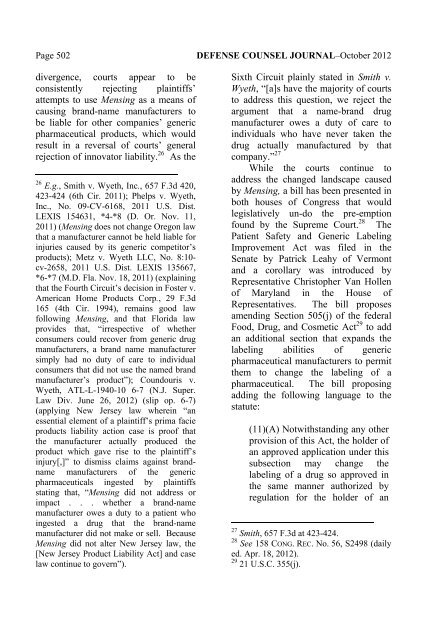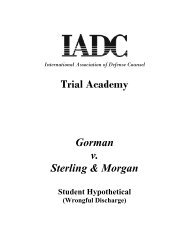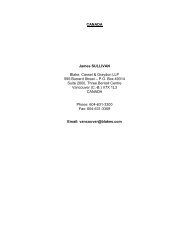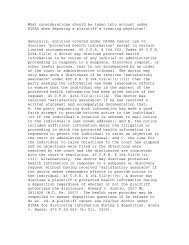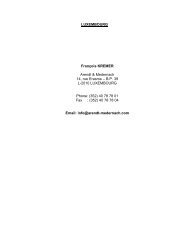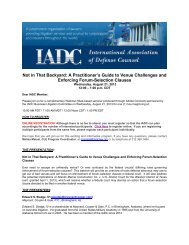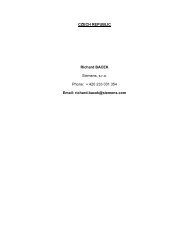Defense Counsel Journal - International Association of Defense ...
Defense Counsel Journal - International Association of Defense ...
Defense Counsel Journal - International Association of Defense ...
Create successful ePaper yourself
Turn your PDF publications into a flip-book with our unique Google optimized e-Paper software.
Page 502 DEFENSE COUNSEL JOURNAL–October 2012divergence, courts appear to beconsistently rejecting plaintiffs’attempts to use Mensing as a means <strong>of</strong>causing brand-name manufacturers tobe liable for other companies’ genericpharmaceutical products, which wouldresult in a reversal <strong>of</strong> courts’ generalrejection <strong>of</strong> innovator liability. 26 As the26 E.g., Smith v. Wyeth, Inc., 657 F.3d 420,423-424 (6th Cir. 2011); Phelps v. Wyeth,Inc., No. 09-CV-6168, 2011 U.S. Dist.LEXIS 154631, *4-*8 (D. Or. Nov. 11,2011) (Mensing does not change Oregon lawthat a manufacturer cannot be held liable forinjuries caused by its generic competitor’sproducts); Metz v. Wyeth LLC, No. 8:10-cv-2658, 2011 U.S. Dist. LEXIS 135667,*6-*7 (M.D. Fla. Nov. 18, 2011) (explainingthat the Fourth Circuit’s decision in Foster v.American Home Products Corp., 29 F.3d165 (4th Cir. 1994), remains good lawfollowing Mensing, and that Florida lawprovides that, “irrespective <strong>of</strong> whetherconsumers could recover from generic drugmanufacturers, a brand name manufacturersimply had no duty <strong>of</strong> care to individualconsumers that did not use the named brandmanufacturer’s product”); Coundouris v.Wyeth, ATL-L-1940-10 6-7 (N.J. Super.Law Div. June 26, 2012) (slip op. 6-7)(applying New Jersey law wherein “anessential element <strong>of</strong> a plaintiff’s prima facieproducts liability action case is pro<strong>of</strong> thatthe manufacturer actually produced theproduct which gave rise to the plaintiff’sinjury[,]” to dismiss claims against brandnamemanufacturers <strong>of</strong> the genericpharmaceuticals ingested by plaintiffsstating that, “Mensing did not address orimpact . . . whether a brand-namemanufacturer owes a duty to a patient whoingested a drug that the brand-namemanufacturer did not make or sell. BecauseMensing did not alter New Jersey law, the[New Jersey Product Liability Act] and caselaw continue to govern”).Sixth Circuit plainly stated in Smith v.Wyeth, “[a]s have the majority <strong>of</strong> courtsto address this question, we reject theargument that a name-brand drugmanufacturer owes a duty <strong>of</strong> care toindividuals who have never taken thedrug actually manufactured by thatcompany.” 27While the courts continue toaddress the changed landscape causedby Mensing, a bill has been presented inboth houses <strong>of</strong> Congress that wouldlegislatively un-do the pre-emptionfound by the Supreme Court. 28 ThePatient Safety and Generic LabelingImprovement Act was filed in theSenate by Patrick Leahy <strong>of</strong> Vermontand a corollary was introduced byRepresentative Christopher Van Hollen<strong>of</strong> Maryland in the House <strong>of</strong>Representatives. The bill proposesamending Section 505(j) <strong>of</strong> the federalFood, Drug, and Cosmetic Act 29 to addan additional section that expands thelabeling abilities <strong>of</strong> genericpharmaceutical manufacturers to permitthem to change the labeling <strong>of</strong> apharmaceutical. The bill proposingadding the following language to thestatute:(11)(A) Notwithstanding any otherprovision <strong>of</strong> this Act, the holder <strong>of</strong>an approved application under thissubsection may change thelabeling <strong>of</strong> a drug so approved inthe same manner authorized byregulation for the holder <strong>of</strong> an27 Smith, 657 F.3d at 423-424.28 See 158 CONG. REC. No. 56, S2498 (dailyed. Apr. 18, 2012).29 21 U.S.C. 355(j).


